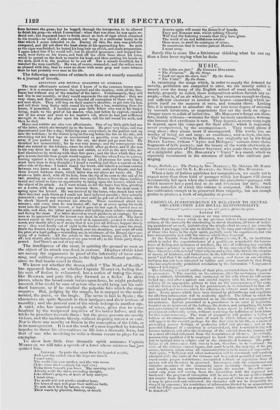MUSIC.
" The lights are fair." By GEORGE HOGARTIT.
" The Primrose, By the Same. " Look out upon the stars, love." By the Same. " The Violet." By the Same.
In examining the songs which, in order to supply the demand for novelty, publishers are compelled to utter, we are usually called to mourn over the decay of the English school of vocal melody. Of melody, properly so culled, those compositions seldom furnish any ex• ample,—that is, of an air which, per se, has sweetness enough to charm, and sufficient character to interest the hearer—something which im- prints itself on the memory at once, and remains there. Lacking this, it is attempted to stimulate the car into some degree of attention by uncouth harmonies, or suspensions that set the teeth on edge— vinegar sauce to a dish of boiled rice. Mr. Homitcru's Songs are, there- fore, doubly welcome—welcome for their intrinsic excellence, welcome also because that excellence is rare. They depend, as every song ought to depend, upon the voice-part for their effect ; which is supported, never overpowered, by the accompaniment. They would please if sung alone; they please more if accompanied. The words, too, are worthy of being set and sung ; an excellence, now-a-days, also rare. " The Primrose," written by HERRICK, was originally set by his friend HENRY LAWES, (whose " Ayres and Dialogues" contain some choice fragments of lyric poetry) ; and the beauty of the words afterwards at- tracted the attention of Professor STEvEss, who made them the subject of a delightful glee. Mr. HonAnnes " Violet" is a round, which we especially recommend to the attention of ladies who cultivate part.


























 Previous page
Previous page